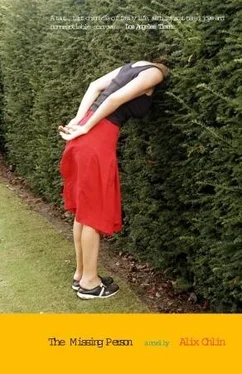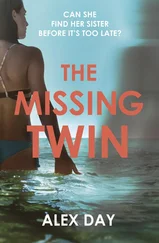An uncharacteristic cloud had settled over the sky, turning the light in the condo to silver. It made me miss New York, its grayness and rain and subways, and Michael, and even the pain of losing him. A person can get nostalgic for anything, as long as it’s in the past. I wandered around the house looking at pictures. There was my parents’ wedding picture, Chicago, 1974: my mother smiling widely between dark red lips, my father looking dazed, as if stunned by his own good fortune. But maybe he was only stunned. There were hardly any other pictures of him around, and most were of Wylie and me. In every recent picture, I noticed, we had the same smile, even, practiced, and not at all genuine, as if really smiling were a childish habit we’d put away forever.
I stared at The Wilderness Kiss for a while, its brilliant dark colors, the woman and man locked in a kind of combat with the desert looming behind them. My mother was right; I’d never thought about the reality of my parents’ marriage, what violence or heartbreak was contained in it, and with what consequences. Why was having a child — the son pictured in The Ball and Chain —so painful to Eva that it drove her insane? Studying the man in the picture, the one cradling his own mother, I saw in his thin, dark countenance a resemblance to both Wylie and Lincoln Kent, the yoga instructor.
As I gazed at the paintings, I pictured my father with Eva on those late nights when I’d thought he was at the lab, and then bringing her work home to my mother in an act of almost brutal defiance. He must have known about her and David. He knew, and Eva was his revenge. Rose red, romantic red, red in the afternoon. But he wouldn’t leave my mother for her, even after she became pregnant, because of me and Wylie. And Eva went crazy, crazy enough to set fires and destroy her own work, just as crazy as Daphne Michaelson, alone in her house while her husband and my mother watched television together.
I had an almost dizzy feeling, as if I were standing at the edge of a towering cliff, and picked up the flyer from Blue Butterfly Yoga. Lincoln was teaching Ashtanga that afternoon at four o’clock. I drove up to Santa Fe, where I sat in the Caprice with my eyes on the door to the yoga studio. Only a few cars were parked in the lot. Blue Butterfly was housed in a strip mall along with a New Age bookstore, an ice cream parlor, and the coffee shop I’d noticed before, each establishment elegant in fake adobe. Behind the strip mall rose another one; they were lined up, block after block. I hadn’t eaten much besides the ice cream, and my stomach rumbled. At five-thirty people started filtering out of the yoga place. Glowing and relaxed, carrying mats and bags, they were all wearing tights or tight shorts and tight tops, clothes that covered their bodies like sausage casings. I had the windows down, and as they filed away I could hear snippets of their conversations, comments regarding numerology and nutrition, the cancerous death of a woman’s aunt (“It’s like her anger ate her up inside, literally”), and the difference between Reiki and Fendelkrais, as physical disciplines go. Lincoln Kent came out last and locked the outside door. He was wearing long black leggings and a red tank top, and with his straight posture and well-molded shoulders he looked like a ballet dancer on a short break from class. His features were small and perfect, and his short hair, fashionably cut, was dark brown, like Wylie’s and mine. Everything about him was well formed and exquisite, like a Christmas ornament or a Hummel figurine.
I got out of the car and approached him, hoping that he wouldn’t recognize me. “Excuse me,” I said. “I’m lost. Could you help me?”
“Ah, tourists,” he said, pointing with a well-muscled arm. “To get to the Plaza, you need to head that way.”
“Actually, I’m looking for a place called Enchanted Mesa. I’m supposed to visit my great-aunt and I misplaced the address.”
He smiled and took me by the arm. “I go to Enchanted Mesa all the time. It’s right around the corner. I can even walk you there, if you don’t mind a couple blocks.”
I thanked him profusely, and he led me down the street as I tried to figure out what to say to him.
“I think it’s a lovely facility,” he said confidingly, “and I did a lot of research. How long has your great-aunt been living there?”
“Um, not long, I don’t think,” I said. “What about your relative?”
“For ages and ages,” he said. “The quality of care is excellent. It is a little hard to find, but once you’ve been there you won’t have any problems.”
We stopped in front of an adobe apartment building, by the front door with a small plaque that read ENCHANTED MESA. In a parlor to the right, a few old people in armchairs were staring disconsolately out at the bushes. Down the hallway some plinky jazz standard was being played on a piano. The place had the plush carpeting and smoothly recirculated air of an expensive institution, and the flowers on a stand in the hallway were real. But the scent of potpourri in the air wasn’t quite strong enough to disguise the smell of ammonia and feces beneath it.
Squeezing my arm, Lincoln Kent marched up to the reception desk, where a middle-aged woman with short red hair and purple lipstick greeted him by name.
“Hi, Bernice,” he said. “She’s looking for her great-aunt. Would you help her?”
This was worse than crashing advanced yoga.
Bernice smiled at me. “What’s her name?”
“Sylvia Beachman?” I said. This was my great-aunt, who lived in Evanston, Illinois, with my great-uncle Davis and three dachshunds. Every Christmas she sent me a card and a ten-dollar bill.
Bernice frowned and typed away at the computer.
I turned to Lincoln. “Thank you so much,” I told him. “I don’t mean to keep you.”
“Hey, my pleasure. Peace. Bernice, I’ll go check on her while I’m here.”
Bernice waved without taking her eyes off the screen, and he wandered off down the hall. “I’m not seeing a Sylvia Beachman,” she said.
“That can’t be right,” I said.
“Well, I know everybody in here, and I’ve never heard of a Sylvia Beachman.”
“That can’t be,” I said. “She writes me all the time. This is Enchantment Mission, isn’t it?”
“Enchant ment Mission ?” Bernice raised an eyebrow. “This is Enchant ed Mesa. I don’t know about any Enchantment Mission.”
“Oh, man,” I said. “I don’t believe this.”
“You’ve never visited her before?”
“I’m from New York.” I leaned forward. “Listen, do you mind if I just go find Lincoln and tell him what happened? He’s been helping me.”
Bernice looked me up and down and decided, apparently, that I wasn’t a threat to the elderly.
“Room 325,” she said wearily. “Sign in here.”
I walked down one carpeted hallway to another, past the open doors of shared rooms, the sounds of competing televisions broadcasting game shows and local news. An old woman in a light-blue cable-knit cardigan sat weeping in a doorway, her mouth rigid with pain or sadness, the thin wisps of her hair trembling in concert with her sobs. Some old people were playing cards in a lounge whose windows faced the side of the Blue Butterfly strip mall. Through one window I could see a teenaged girl wiping down the counter of the ice cream parlor, and from this context her smooth, tanned skin and long legs looked profane, or dreamlike, or both.
Inside room 325, Lincoln Kent and a woman were sitting in facing chairs. From the photograph I’d seen, she was recognizably Eva Kent — but aged, decrepit, blank. Her dark hair was shot through with gray and hung limply to her chin. She was wearing baggy pink pants and a white shirt with a flower pattern; the sleeves fell to her wrists, but the skin on her hands was mottled red and white as if ravaged by some disease: the fire. She slouched in her chair, hunched over her low, large breasts. There was no trace of the ferocious pregnant woman with the center part and the burning cigarette, or of the woman in the painting with a slash of red across her face. In fact there was no trace of anything at all. Lincoln was reading to her, but she didn’t seem to be listening, only staring into space. Her room was generic, artless, plain, and it smelled bad. Whatever she had once been, I thought, she wasn’t an artist now.
Читать дальше












